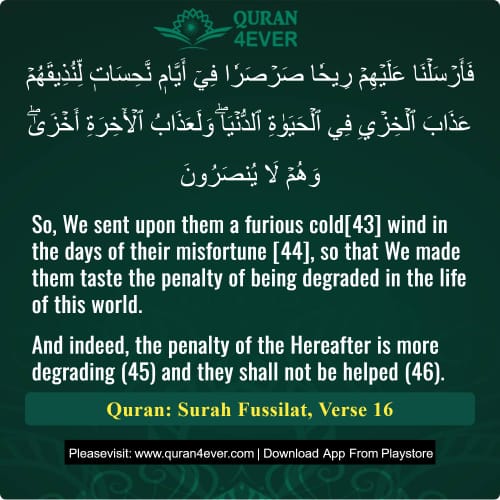
Transliteration:( Fa arsalnaa 'alaihim reehan sarsaran feee ayyaamin nahisaatil linuzeeqahum 'azaabal khizyi fil hayaatid dunyaa wa la'azaabul Aakhirati akhzaa wa hum laa yunsaroon )
So, We sent upon them a furious cold [43] wind in the days of their misfortune [44], so that We made them taste the penalty of being degraded in the life of this world. And indeed, the penalty of the Hereafter is more degrading [45], and they shall not be helped [46].
Allah sent upon the people of ‘Aad a violent, icy wind—furious in force, but without any rain.
It was so intensely cold and devastating that only Allah’s protection could shield from it.
This demonstrates Allah’s power: He destroys the mighty through seemingly insignificant means—like Namrood through a mosquito, and Abraha’s army through tiny birds.
The days in which punishment descended upon them were days of misfortune.
According to Tafseer Roohul Ma‘ani, the punishment began on Wednesday, 22 Shawwal, and continued until Wednesday, 29 Shawwal, lasting eight days and seven nights.
This also teaches that:
Some days are indeed inauspicious, especially those in which divine punishment occurs.
More importantly, any day devoid of righteous deeds becomes inauspicious due to the evil of human actions, not due to inherent bad luck.
The worldly punishment inflicted upon them was humiliating, but the punishment of the Hereafter is far more severe and disgraceful.
Unlike believers, whose worldly hardships reduce their Hereafter burden, disbelievers gain no relief—both this world and the next bring them loss.
One aspect of punishment for the disbelievers is that they will have no helper, supporter, or intercessor.
This complete abandonment reflects the utter rejection of mercy and protection, a punishment in itself and a sign of their total failure.
The tafsir of Surah Fussilat verse 16 by Ibn Kathir is unavailable here.
Please refer to Surah Fussilat ayat 13 which provides the complete commentary from verse 13 through 19.
(41:16) whereupon We sent upon them a fierce wind on inauspicious days[20] that We might make them taste a degrading chastisement in the life of this world.[21] And surely the chastisement of the Hereafter is even more degrading. There will be none to help them there.
20. “Evil days” does not mean that the days in themselves were evil or ill-omened, and the torrent came because the people of Aad met with those evil or ill-omened days. If this were the meaning and there were some ill omen in the days themselves, the torment would have visited all the nations of the world. The correct meaning, therefore, is that since in those days God’s torment descended on this nation, the days were evil or ill-omened for the people of Aad. It is not correct to argue on the basis of the verse that some days are ill-omened and some auspicious.
The lexicographers have disputed the meaning of the words rih-an sarsaran, which have been used for the stormy wind. Some say that they imply an intensely hot wind, others say that they imply an extremely cold wind, and some others say that they imply a wind which produces a great noise when it blows. In any case, they all agree that the words are used for a severe storm.
The details of this torment given at other places in the Quran show that this wind continued to rage for seven nights and eight days consecutively. It swept the people off the ground and they fell down dead and lay scattered here and there like hollow trunks of the palm-tree. (Surah Al- Haaqqah, Ayat 7). It left rotting everything on which it blew. (Surah Adh-Dhariyat, Ayat 42). When the people of Aad saw it advancing, they rejoiced with the hope that the dense clouds would bring much rain, which would water their withering crops. But when it came, it laid waste the entire land. (Surah Al-Ahqaf, Ayat 24-25).
21. This ignominious torment was an answer to their arrogance and vanity because of that which they had assumed greatness in the land without any right, and would boast that there was none more powerful than them on the entire earth. Allah disgraced them and destroyed the major part of their population along with their civilization. The remnant of their population was humbled and debased before those very nations whom they used to overawe by their show of power and might for the details of the story of Aad see (Surah Al-Aaraf, Ayat 65-72); (Surah Houd, Ayat 50-60); (Surah Al-Muminun, Ayat 32-41); (Surah Ash-Shuara, Ayat 123-140); (Surah Al-Ankabut, Ayat 40) and the relevant E.Ns.

For a faster and smoother experience,
install our mobile app now.
Related Ayat(Verses)/Topics